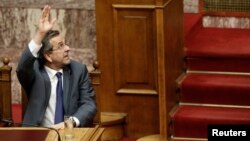ATHENS —
Greek Prime Minister Antonis Samaras pledged on Thursday banks would not seize the homes of borrowers unable to pay their mortgages, seeking to soothe fears that plans to lift a ban on repossessions will make thousands homeless.
International lenders, worried about a deteriorating repayment culture and rising bad loans for banks, have urged Athens to improve insolvency laws to help clear delinquent household debt, including lifting a ban on home foreclosures.
But the move to lift the freeze on forced auctions - due to expire on Dec. 31 - has provoked stiff opposition among lawmakers, including some in Samaras's two-party coalition government who have warned the issue is a red line.
“The primary residence of weak citizens and those who can prove they cannot service their debts because of the crisis will be fully protected - this is not negotiable,” Samaras said in a statement after a meeting with his deputy, Evangelos Venizelos, who is head of the Socialist PASOK party in the coalition.
He said the government was looking into a set of measures which would protect vulnerable borrowers and ensure the availability of home credit. But those able to pay would not be allowed to abuse the foreclosure protection, he said.
Greece's depressed economy, pay cuts, higher taxes and an unemployment rate of nearly 28 percent have taken a toll on household budgets, making it hard for many homeowners to keep up with their loan payments.
Based on central bank data in May, 21.4 percent of home loans were delinquent in December 2012, up from 14.9 percent a year earlier, continuing to pound bank balance sheets. Finance Minister Yannis Stournaras said banks could collapse unless restrictions on foreclosures were lifted.
Greece's parliament passed a so-called facilitation plan to resolve distressed household debt earlier this year, encouraging out-of-court settlements and introducing minimum debt payments for those who qualify.
International creditors have said weaknesses in personal insolvency laws and a blanket moratorium on auctions of repossessed assets risk undermining borrowers' repayment behavior.
Greece's main anti-bailout opposition party was quick to criticize any talk of lifting the ban on property foreclosures.
“The government is blindly fixated on implementing a criminal policy that pushes more and more citizens into unemployment and desperation,” the leftist SYRIZA party said.
Property foreclosures have triggered protests in Spain and other indebted, crisis-hit European countries.
International lenders, worried about a deteriorating repayment culture and rising bad loans for banks, have urged Athens to improve insolvency laws to help clear delinquent household debt, including lifting a ban on home foreclosures.
But the move to lift the freeze on forced auctions - due to expire on Dec. 31 - has provoked stiff opposition among lawmakers, including some in Samaras's two-party coalition government who have warned the issue is a red line.
“The primary residence of weak citizens and those who can prove they cannot service their debts because of the crisis will be fully protected - this is not negotiable,” Samaras said in a statement after a meeting with his deputy, Evangelos Venizelos, who is head of the Socialist PASOK party in the coalition.
He said the government was looking into a set of measures which would protect vulnerable borrowers and ensure the availability of home credit. But those able to pay would not be allowed to abuse the foreclosure protection, he said.
Greece's depressed economy, pay cuts, higher taxes and an unemployment rate of nearly 28 percent have taken a toll on household budgets, making it hard for many homeowners to keep up with their loan payments.
Based on central bank data in May, 21.4 percent of home loans were delinquent in December 2012, up from 14.9 percent a year earlier, continuing to pound bank balance sheets. Finance Minister Yannis Stournaras said banks could collapse unless restrictions on foreclosures were lifted.
Greece's parliament passed a so-called facilitation plan to resolve distressed household debt earlier this year, encouraging out-of-court settlements and introducing minimum debt payments for those who qualify.
International creditors have said weaknesses in personal insolvency laws and a blanket moratorium on auctions of repossessed assets risk undermining borrowers' repayment behavior.
Greece's main anti-bailout opposition party was quick to criticize any talk of lifting the ban on property foreclosures.
“The government is blindly fixated on implementing a criminal policy that pushes more and more citizens into unemployment and desperation,” the leftist SYRIZA party said.
Property foreclosures have triggered protests in Spain and other indebted, crisis-hit European countries.





